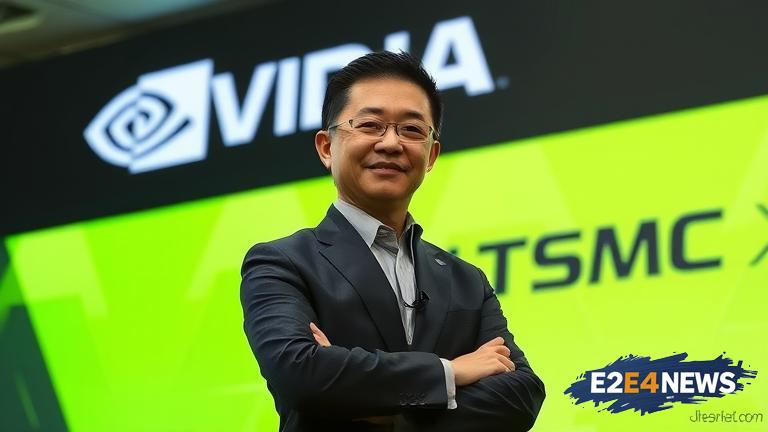NVIDIA CEO Jensen Huang recently visited Taiwan Semiconductor Manufacturing Company (TSMC), the world’s largest independent semiconductor foundry, amidst ongoing talks between the US and China regarding chip production. The meeting has sparked intense speculation about potential collaborations between the two companies, as well as the implications for the tech industry as a whole. Huang’s visit comes at a time when the US is seeking to strengthen its position in the global chip market, while China is looking to reduce its dependence on foreign technology. The US has been in talks with China to establish new rules and regulations regarding chip production, with a focus on ensuring the security and integrity of the global supply chain. TSMC has been a key player in these talks, given its significant role in producing chips for many of the world’s leading tech companies. The company has already announced plans to build a new chip factory in the US, which is expected to come online in the near future. Huang’s visit to TSMC is seen as a significant development in the ongoing negotiations between the US and China, and has sparked hopes that a deal may be imminent. However, the talks are complex and involve many different stakeholders, making it difficult to predict a successful outcome. The US has been seeking to persuade TSMC to prioritize the production of chips for American companies, while China has been pushing for greater access to advanced chip technology. The implications of these talks are far-reaching, with potential consequences for the global economy, national security, and the future of the tech industry. NVIDIA, as a leading player in the field of artificial intelligence and graphics processing, has a significant stake in the outcome of these talks. The company has been investing heavily in the development of new chip technologies, and a successful outcome to the US-China talks could provide a major boost to its business. However, the company also faces significant challenges, including intense competition from rival firms and the need to navigate complex regulatory environments. Despite these challenges, Huang’s visit to TSMC is seen as a positive development, and has sparked hopes that NVIDIA may be able to establish a stronger partnership with the Taiwanese firm. Such a partnership could provide NVIDIA with access to advanced chip manufacturing capabilities, allowing it to accelerate the development of new technologies. The visit also highlights the importance of Taiwan in the global chip market, with the island nation playing a critical role in the production of advanced semiconductors. The US has been seeking to strengthen its ties with Taiwan, as part of its efforts to counter China’s growing influence in the region. The ongoing talks between the US and China are likely to have significant implications for the global tech industry, with potential consequences for companies such as NVIDIA, TSMC, and many others. As the negotiations continue, all eyes will be on the outcome, with many hoping for a successful resolution that will provide a boost to the industry as a whole. The visit by Huang to TSMC is just the latest development in a complex and ongoing saga, and it remains to be seen how the situation will unfold in the coming weeks and months. One thing is certain, however: the outcome of these talks will have far-reaching consequences for the global tech industry, and will be closely watched by companies, investors, and governments around the world. The US-China chip talks are a complex and multifaceted issue, involving many different stakeholders and interests. The talks are focused on establishing new rules and regulations regarding chip production, with a focus on ensuring the security and integrity of the global supply chain. The US has been seeking to persuade TSMC to prioritize the production of chips for American companies, while China has been pushing for greater access to advanced chip technology. The implications of these talks are far-reaching, with potential consequences for the global economy, national security, and the future of the tech industry. NVIDIA, as a leading player in the field of artificial intelligence and graphics processing, has a significant stake in the outcome of these talks. The company has been investing heavily in the development of new chip technologies, and a successful outcome to the US-China talks could provide a major boost to its business.
